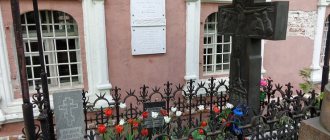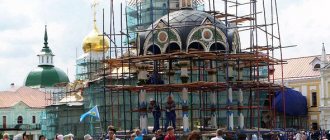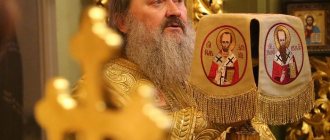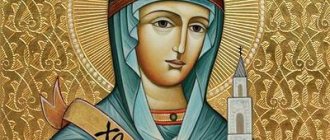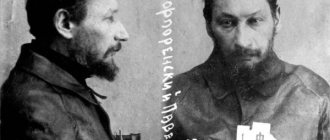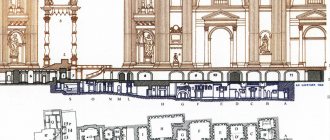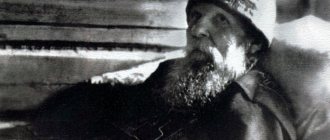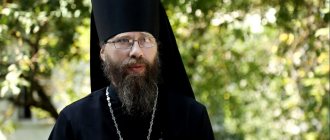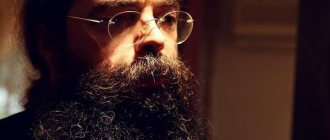MOSCOW, August 25. /TASS/. The Holy Synod of the Russian Orthodox Church (ROC) replaced the heads of the Chuvash, Buryat, Simbirsk, Saratov, Tver and Vologda metropolitanates, Vladimir Legoida, chairman of the Synodal Department for Church Relations with Society and the Media of the Moscow Patriarchate, told reporters on Tuesday.
“The head of the Chuvash Metropolis should be Metropolitan Savvaty of Ulan-Ude and Buryat, with his release from the administration of the Ulan-Ude diocese. <…> Metropolitan Joseph of Simbirsk and Novospassky will be the head of the Buryat Metropolis, with his release from the administration of the Simbirsk diocese. <…> Metropolitan Longin of Saratov and Volsk will be the head of the Simbirsk Metropolis, with his release from the administration of the Saratov diocese. <…> Metropolitan Ignatius of Vologda and Kirillov should be the head of the Saratov Metropolis, with his release from the administration of the Vologda diocese,” he quoted the resolutions of the Synod.
In addition, the Synod replaced the head of the Tver Metropolis. “The head of the Tver Metropolis is to be Archbishop Ambrose of Vereya, vicar of His Holiness the Patriarch of Moscow and All Rus', with his release from the post of vicar of the Sretensky Stavropegic Monastery in Moscow and rector of the Sretensky Theological Seminary. Metropolitan Savva of Tver and Kashin is destined to be the Eminence of Vologda and Kirillov, the head of the Vologda Metropolis,” Legoyda added.
The Holy Synod also replaced the chairman of the Synodal Department of Religious Education and Catechesis (OROiK) of the Moscow Patriarchate.
“To relieve Metropolitan of Rostov and Novocherkassk Mercury from the post of chairman of the Synodal Department of Religious Education and Catechesis, expressing gratitude to him for the labors incurred in this position. Appoint Bishop Eugene of Bronnitsky, vicar of the Patriarch of Moscow and All Rus', as the chairman of the Synodal Department of Religious Education and Catechesis,” he quoted the resolutions of the Synod.
Metropolitan Mercury (Ivanov), as Legoyda said, was also appointed to the position of general director of the Sofrino art and production enterprise. Previously, he was the acting director of the enterprise.
An excerpt characterizing the List of abbots of the Trinity-Sergius Lavra
Coming out onto the road, the man paused, looked around and headed towards the thinning wall of trees. At a large oak tree that had not yet shed its leaves, he stopped and mysteriously beckoned to him with his hand. Denisov and Petya drove up to him. From the place where the man stopped, the French were visible. Now, behind the forest, a spring field ran down a semi-hillock. To the right, across a steep ravine, a small village and a manor house with collapsed roofs could be seen. In this village and in the manor's house, and throughout the hillock, in the garden, at the wells and pond, and along the entire road up the mountain from the bridge to the village, no more than two hundred fathoms away, crowds of people were visible in the fluctuating fog. Their non-Russian screams at the horses in the carts struggling up the mountain and calls to each other were clearly heard. “Give the prisoner here,” Denisop said quietly, not taking his eyes off the French. The Cossack got off his horse, took the boy off and walked up to Denisov with him. Denisov, pointing to the French, asked what kind of troops they were. The boy, putting his chilled hands in his pockets and raising his eyebrows, looked at Denisov in fear and, despite the visible desire to say everything he knew, was confused in his answers and only confirmed what Denisov was asking. Denisov, frowning, turned away from him and turned to the esaul, telling him his thoughts. Petya, turning his head with quick movements, looked back at the drummer, then at Denisov, then at the esaul, then at the French in the village and on the road, trying not to miss anything important. - Dolokhov is coming, he’s not coming, we have to beat him!.. Eh? - Denisov said, his eyes flashing merrily. “The place is convenient,” said the esaul. “We’ll send the infantry down through the swamps,” Denisov continued, “they’ll crawl up to the garden; you will come with the Cossacks from there,” Denisov pointed to the forest outside the village, “and I will come from here, with my gusags.” And according to the road... “It won’t be a hollow—it’s a quagmire,” said the esaul. “You’ll get stuck in the horses, you need to go around to the left... While they were talking in a low voice in this way, below, in the ravine from the pond, one shot clicked, smoke turned white, another, and a friendly, seemingly cheerful cry of hundreds of French voices who were on the half-mountain was heard. In the first minute, both Denisov and the esaul moved back. They were so close that it seemed to them that they were the cause of these shots and screams. But the shots and screams did not apply to them. Below, through the swamps, a man in something red was running. Apparently he was being shot at and shouted at by the French. “After all, this is our Tikhon,” said the esaul. - He! they are! “What a rogue,” Denisov said. - He will go away! - Esaul said, narrowing his eyes. The man they called Tikhon, running up to the river, splashed into it so that splashes flew, and, hiding for a moment, all black from the water, he got out on all fours and ran on. The French running after him stopped. “Well, he’s clever,” said the esaul. - What a beast! – Denisov said with the same expression of annoyance. - And what has he been doing so far? - Who is this? – Petya asked. - This is our plastun. I sent him to take the tongue. “Oh, yes,” Petya said from Denisov’s first word, nodding his head as if he understood everything, although he absolutely did not understand a single word. Tikhon Shcherbaty was one of the most necessary people in the party. He was a man from Pokrovskoye near Gzhat. When, at the beginning of his actions, Denisov came to Pokrovskoye and, as always, calling the headman, asked what they knew about the French, the headman answered, as all the headmen answered, as if defending themselves, that they didn’t know anything, to know they don't know. But when Denisov explained to them that his goal was to beat the French, and when he asked if the French had wandered in, the headman said that there were definitely marauders, but that in their village only one Tishka Shcherbaty was involved in these matters. Denisov ordered Tikhon to be called to him and, praising him for his activities, said a few words in front of the headman about the loyalty to the Tsar and the Fatherland and the hatred of the French that the sons of the Fatherland should observe. “We don’t do anything bad to the French,” said Tikhon, apparently timid at Denisov’s words. “That’s the only way we fooled around with the guys.” They must have beaten about two dozen Miroders, otherwise we didn’t do anything bad... - The next day, when Denisov, completely forgetting about this guy, left Pokrovsky, he was informed that Tikhon had joined the party and asked to be left with it. Denisov ordered to leave him. Tikhon, who at first corrected the menial work of laying fires, delivering water, skinning horses, etc., soon showed greater willingness and ability for guerrilla warfare. He went out at night to hunt for prey and each time brought with him French clothes and weapons, and when he was ordered, he also brought prisoners. Denisov dismissed Tikhon from work, began to take him with him on travels and enrolled him in the Cossacks. Tikhon did not like to ride and always walked, never falling behind the cavalry. His weapons were a blunderbuss, which he wore more for fun, a pike and an ax, which he wielded like a wolf wields his teeth, equally easily picking out fleas from his fur and biting through thick bones. Tikhon equally faithfully, with all his might, split logs with an ax and, taking the ax by the butt, used it to cut out thin pegs and cut out spoons. In Denisov's party, Tikhon occupied his special, exclusive place. When it was necessary to do something especially difficult and disgusting - turn a cart over in the mud with your shoulder, pull a horse out of a swamp by the tail, skin it, climb into the very middle of the French, walk fifty miles a day - everyone pointed, laughing, at Tikhon. “What the hell is he doing, you big gelding,” they said about him. Once, the Frenchman whom Tikhon was taking shot at him with a pistol and hit him in the flesh of his back. This wound, for which Tikhon was treated only with vodka, internally and externally, was the subject of the funniest jokes in the entire detachment and jokes to which Tikhon willingly succumbed. - What, brother, won’t you? Is Ali crooked? - the Cossacks laughed at him, and Tikhon, deliberately crouching and making faces, pretending that he was angry, scolded the French with the most ridiculous curses. This incident had only the influence on Tikhon that after his wound he rarely brought prisoners.
Moscow Theological Academy
The Holy Synod of the Russian Orthodox Church (ROC) also replaced the rector of the Moscow Theological Academy (MDA).
“They had a judgment about the state of affairs at the Moscow Theological Academy. Decided: His Eminence Bishop Pitirim of Zvenigorod, vicar of His Holiness the Patriarch of Moscow and All Rus', to be relieved of his post as rector of the Moscow Theological Academy. Appoint His Grace Bishop Theodorit of Skopin and Shatsk as rector of the Moscow Theological Academy with his release from the administration of the Skopin diocese and from the post of rector of the Ryazan Theological Seminary with an expression of gratitude for the work incurred,” Legoida quoted the resolutions of the Synod.
Bishop Theodorit (Tikhonov) has headed the Skopino diocese since his election to this position by the Synod on July 29, 2022. Bishop Pitirim (Tvorogov) on August 30, 2022 was appointed by the Synod as rector of the MDA with release from the management of the Dushanbe diocese.
From the biography of Archimandrite Naum
Archimandrite Naum from the Trinity-Sergius Lavra was born in 1927 on December 19 (by the way, December 19 is the holiday of St. Nicholas the Wonderworker). In the world he was called Nikolai Alexandrovich Bayborodin. The biography of Archimandrite Naum from the Trinity-Sergius Lavra originates in the Siberian village of Shubinka, Novosibirsk region. Nowadays it is called the village of Maloirmenka.
Archimandrite Naum Bayborodin from the Trinity-Sergius Lavra was the son of peasants: his father was Alexander Evfimovich, and his mother was Pelageya Maksimovna. In addition to Nikolai, 7 more children were born into the family, but, unfortunately, they all died in infancy.
A week after his birth (December 25), Naum was baptized in the temple of the same village.
Later, the family moved to the Primorsky Territory, and Nikolai went to school, but the outbreak of the war did not allow him to receive a secondary education (Nahum completed 9 grades).
Compounds
- Moscow Compound (129090, Moscow, 2nd Troitsky lane, 6a, 8/10v; tel.: 281-35-58);
- St. Petersburg Compound (193167, Fontanka embankment, 44);
- Church of the Intercession (Moscow region, Saburovo village);
- former Trinity-Varnitsky Monastery (Yaroslavl region, Rostov the Great; tel.: 8-08536-9-21-38, 9-21-93);
- temple in the name of St. Mary Magdalene (Moscow region, Sergiev Posad, Smena village; tel.: 4-99-38, after 20 o’clock);
- Paraklit courtyard (Moscow region, Sergiev Posad, Smena village; tel.: 4-99-38, after 20 o’clock);
- Church of St. App. Peter and Paul (Moscow region, Sergiev Posad);
- Pyatnitskoye Compound (Russia, 141300, Moscow region, Sergiev Posad; tel.: 4-50-13);
- Radonezh Compound (Moscow region, Sergiev Posad district, Radonezh village; tel.: 3-26-94).
- Church of the Iveron Icon of the Mother of God in Peresvet
- temple of St. Sergius of Radonezh on the Red Hill of the Kulikovo Field (Tula region, Kurkinsky district, near the village of Ivanovka)
- Divnomorsky St. Sergius Church in Gelendzhik
Demise
The death of Archimandrite Naum from the Trinity-Sergius Lavra occurred on October 13, 2022. For the last year, Naum has been in a comatose state. His death was not unexpected and occurred at the age of 89 (the old man did not live long enough to see his ninetieth birthday). The cause of death is not stated, but one can assume that Archimandrite Naum from the Trinity-Sergius Lavra died of old age. The man lived a long life, and everything was in it. And now he is in the Kingdom of God, where there is no disease and evil.
Farewell to Archimandrite Naum of the Trinity-Sergius Lavra took place in the Refectory Church, and the funeral service took place in the Assumption Cathedral. After the funeral liturgy, Naum's burial took place.
The funeral of Archimandrite Naum of the Trinity-Sergius Lavra was performed in a cathedral-monastic rite. All the spiritual children of the elder from many regions of Russia and foreign countries, the entire monastery brethren, students, parishioners, and pilgrims came together.
The service for the repose was led by Arseniy, Metropolitan of Istra.
Army and studies
As you know, Orthodox are not born, but become. Nicholas's path to the church was long.
Since 1944, Nikolai, like all men of that time, was drafted into the Soviet army. The young man did not serve on the front line, but carried out military duties in aviation technical units (moreover, these were command troops; Nikolai was supposed to become a career military man). The service took place in the cities of Riga, Kaliningrad, Siauliai (Lithuania). In 1952, Nikolai was demobilized with the rank of senior sergeant, with encouragement - a commemorative photograph next to the unit’s banner.
After demobilization, he continued his studies at school, and in 1953 he was enrolled as a student at the Polytechnic Institute of the city of Frunze, faculty: physics and mathematics.
While serving in the army and studying at a higher educational institution, Nikolai actively attended church, and after graduating from the institute (1957) he moved to the city of Zagorsk, where he entered the theological seminary. The rector of the cathedral in the city of Frunze signed a letter of recommendation to Nicholas; he saw in the young man a minister of the church and the Lord God and told his clergy: “Time will pass, and Nicholas himself will teach you to read the Apostle.” And in the same year (in the month of October) Nicholas was enrolled in the brethren of the Trinity-Sergius Lavra. Almost a year later (1958, August 14), Nicholas was tonsured as a monk and given the name Naum (in honor of Naum of Radonezh).
Abbots and governors
- Mitrofan ((1337) early 1340s - 1344)
- St. Sergius (1344 - September 25, 1392)
- St. Nikon (1392)
- St. Sava (1392 – 1398)
- St. Nikon, 2nd time (1398 - November 17, 1428)
- Sava II (1428 – 1432)
- Zinovy (1432 – 1445)
- Dositheos I (1445 – 1448)
- St. Martinian (1448 – 1455)
- St. Vassian (Snout) (1455 – 1466)
- Spiridon (1467 – 1474)
- Abraham (1474 – 1478)
- Paisiy (Yaroslavov) (1479 – 1482)
- Joachim (1482 – 1483)
- Macarius (1483 – 1488)
- Athanasius I (1488 – 1490)
- St. Simon Chizh (1490 - September 20, 1495)
- St. Serapion (1495 – 1506)
- Dosifei II (Zabela) (1506 – 1507)
- Pamva (Moshnin) (1508 – 1515)
- Jacob (Kashin) (1515 – 1520)
- Porphyry I (1521 – 1524) [1]
- St. Arseny Komelsky of Vologda (1525 - 1529)
- Alexander (1528 – 1529)
- St. Joasaph (Skripitsyn) (1529 – February 9, 1539)
- Porfiry II (1539 – 1541)
- Alexy (1541 – February 25, 1543)
- Porfiry III (1543)
- Nikander (1543 – 1545)
- Jonah (Shelepin) (1545 – 1549)
- Serapion (Kurtsov) (1549 – 1551)
- Artemy (Hermit) (1551)
- Gury (Luzhetsky) (1552 - 1554)
- Hilarion (Kirillovets) (1554 – 1555)
- Joasaph (Black) (1555 – 1560)
- Eleutherius (1560 – 1562)
- Mercury (Dmitrovets) (1562 – 1566)
- Cyril (November 1566 - November 11, 1568)
- Pamva II (1568 – 1569)
- Theodosius (Vyatka) (1569 – 1571)
- Varlaam I (1571 – 1577)
- Jonah II (1577 – 1584)
- Mitrofan (Dmitrovets) (1584 – 1588)
- Cyprian (Balakhonets) (1588 – 1594)
- Kirill (Zavidov) (July 31, 1594 - March 18, 1605)
- sschmch. Joasaph (1605 - 1609)
- St. Dionysius (Zobninovsky) (1610 – May 12, 1633)
- Nektary (Vyazletin) (1633 – 1640)
- Adrian (1640 – 1656)
- Joasaph (April 25, 1656 – January 1667)
- Theodosius II (1667 – 1674)
- Vincent (1674 – 1694)
- Job (2 May 1694 - 6 June 1697)
- Euthymius (1697 – 1700)
- Hilarion (Vlastevinsky) (1701 – 1704)
- Sylvester (Kholmsky-Volynets) (October 23, 1704 - 1708)
- Joasaph (1708 – 1710)
- Georgy (Dashkov) (1711 – 1718)
- Tikhon (Pisarev) (1718 – 1722)
- Gabriel (Buzhinsky) (March 20, 1722 - October 30, 1726)
- Varlaam (Vysotsky) (1726 - 1737)
- Arseny (Voronov) (1737 – 1738)
- Ambrose (Dubnevich) (1739 – September 8, 1742)
- Kirill (Florinsky) (1742 – 1744)
- Theodosius (Yankovsky) (1742 - 1745)
- St. Joasaph (Gorlenko) (January 24, 1745 - 1748)
- Plato (Levshin) (March 1763 - 1766)
- Pavel (Ponomarev) (August 28, 1775 - 1782)
- Apollos (Baibakov) (1782 - 1783)
- Dosifey (Ilyin) (1786 - 1793)
- Pavel (Ponomarev), priest. (mentioned 1796)
- Sergius (Krylov-Platonov) (February 16 - November 1803, mentioned November 16, 1808)
- Samuel (Zapolsky-Platonov) (February 20, 1810 - 1814)
- Nikanor (Klementyevsky) (1814 - 1818)
- Afanasy (Fedorov) (? - February 23, 1831)
- St. Antony (Medvedev) (March 10, 1831 - May 12, 1877)
- Leonid (Kavelin) (July 3, 1877 – October 22, 1891)
- Pavel (Glebov) (December 21, 1891 - March 1, 1904)
- Tobia (Tsymbal) (March 6, 1904 - January 1915)
- prmch. Kronid (Lyubimov) (January 9, 1915 - 1920 (- December 10, 1937))
- Gury (Egorov) (1945 - August 1946)
- Vladimir (Kobets) (1946) acting governor
1920 - 1945 - closure and desecration
- Varnava (Kedrov) (ca. 1970 - ca. 1972) acting governor
Literature
- Orthodox Russian monasteries: A complete illustrated description of Orthodox Russian monasteries in the Russian Empire and on Athos... [1910]. (Rep. publishing house St. Petersburg, 1994).. St. Petersburg. Soykin P.P.. 1994.
- Ilyin M., Moiseeva T.. Moscow and Moscow region: Directory guide.. Moscow. 1979.
- Belyaev S. In eternal memory there will be a righteous person...: Finding the relics of St. Moscow Philaret, St. Moscow Innocent and Archimandrite. Antonia. Journal of the Moscow Patriarchate. Moscow. 1996. No. 12. p. 57-67.
- Belyaev S. Finding the holy relics of St. Maxim the Greek.. Journal of the Moscow Patriarchate.. Moscow. 1996. No. 9. p. 74-77..
- Grigorieva T. Meeting with Lavra. Blagovest. Samara. 1997. No. 19. p. 6..
- Nikolaeva T.E., Sudarikov V.A., Chapnin S.V.. Orthodox Moscow: Directory of monasteries and temples. M.. Publishing house of the Brotherhood of St. Tikhon. 2001. 320.
